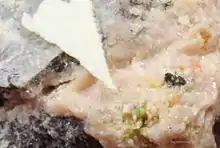| Akrochordite | |
|---|---|
 Bright green, vitreous, cluster of eveite (under 0.5 mm) and brown, subhedral akrochordite in a contrasting, pink, granular carbonate matrix | |
| General | |
| Category | Phosphate minerals |
| Formula (repeating unit) | (Mn,Mg)4(AsO4)2(OH)4·4H2O |
| IMA symbol | Akr[1] |
| Strunz classification | 8.DD.10 |
| Crystal system | Monoclinic |
| Crystal class | Prismatic (2/m) (same H-M symbol) |
| Space group | P21/c |
| Identification | |
| Color | Yellowish red-brown, pale to dark brown, pale pink |
| Cleavage | Perfect. On {010} , perfect; a second, perpendicular to the first. |
| Tenacity | Brittle |
| Mohs scale hardness | 3+1⁄2 |
| Luster | Sub-Vitreous, resinous, dull |
| Diaphaneity | Translucent |
| References | [2][3][4] |
Akrochordite is a rare hydrated arsenate mineral with the chemical formula (Mn,Mg)4(AsO4)2(OH)4·4H2O and represents a small group of rare manganese (Mn) arsenates and, similarly to most other Mn-bearing arsenates, possess pinkish colour. It is typically associated with metamorphic Mn deposits.[3][5]
References
- ↑ Warr, L.N. (2021). "IMA–CNMNC approved mineral symbols". Mineralogical Magazine. 85 (3): 291–320. Bibcode:2021MinM...85..291W. doi:10.1180/mgm.2021.43. S2CID 235729616.
- ↑ Mineralienatlas
- 1 2 Mindat
- ↑ Webmineral data
- ↑ Handbook of Mineralogy
This article is issued from Wikipedia. The text is licensed under Creative Commons - Attribution - Sharealike. Additional terms may apply for the media files.